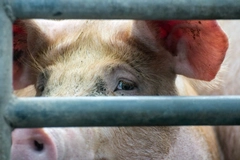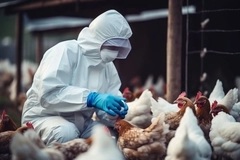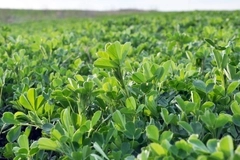
- Industry news
Industry news
- Category news
Category news
- Reports
- Key trends
- Multimedia
- Journal
- Events
- Suppliers
- Home
- Industry news
Industry news
- Category news
Category news
- Reports
- Key trends
- Multimedia
- Events
- Suppliers
Thanksgiving turkey study flags regenerative agriculture can boost fatty acid ratios and phytochemicals

As Thanksgiving festivities approach, a study investigating the sustainability and farming conditions of turkey, a traditional holiday delicacy, has revealed that turkey producer Diestel Family Ranch’s turkey grown with regenerative farming practices are “not only better for the land but can also improve fatty acid ratios and phytochemicals in turkeys.”
US-based Utah State University analyzed the nutritional composition of Diestel’s turkey and compared it with a leading national turkey brand using mass spectrometry-based techniques.
“Our nutrient density reports have shown that our regenerative birds have a better nutrient profile than the national leading brand. We firmly believe that the regenerative practices coupled with regeneratively grown feed support these outcomes,” Heidi Diestel, a fourth-generation farmer at Diestel Family Ranch, tells Food Ingredients First.
“Our regenerative birds have a better omega 6:3 ratio in the breast samples. We have also found significantly higher phytochemical antioxidants in the ground turkey samples tested.”
Additionally the regenerative birds demonstrated a higher overall protein content than the conventional turkey, she adds.
The study also revealed higher levels of vitamins B3 and B12 in Diestel’s regenerative samples.
Why regenerative farming?
Regenerative agriculture prioritizes the health of the soil and excludes the use of industrial farming methods that have been known to impact the planet negatively, explains Diestel.
 Diestel uses rotational grazing, reduced tilling and crop rotations in its regenerative farming practices, farmer Heidi Diestel tells us.“We use practices like rotational grazing, reduced tilling, crop rotations and maintaining vegetative cover. Regenerative farming can not only sustain farms but also support a thriving environment.”
Diestel uses rotational grazing, reduced tilling and crop rotations in its regenerative farming practices, farmer Heidi Diestel tells us.“We use practices like rotational grazing, reduced tilling, crop rotations and maintaining vegetative cover. Regenerative farming can not only sustain farms but also support a thriving environment.”
“Essentially, we provide the opportunity for the land to begin restoring the entire ecosystem, promoting biodiversity and measuring our progress year after year. A healthier environment provides the birds with the most natural environment as they are integrated into the ecosystem at large.”
Earlier this year, Diestel became the “first turkey producer to achieve Regenified certification.”
Additionally, the ranch claims its regenerative birds were the first to be fed 650-metric tons of US-grown Certified Regenerative corn that directly improves bird and soil health.
“The Regenified certification is an important recognition of what has always differentiated our brand: holistic farming practices that prioritize the turkeys on our farm and the land where they are raised,” notes Diestel.
The farmers also use compost for soil health.
“We turn our organic waste into valuable, nutrient-dense compost. The compost creates a healthy, diverse environment for microbiology to thrive no matter where it’s used.”
 Diestel Regenerative samples were found to have higher vitamin B3 and B12 levels compared to a national leading brand.Meanwhile, industry giants like Cargill and PepsiCo have also noted regenerative agriculture practices and integrated them into their operations while encouraging greater farmer involvement.
Diestel Regenerative samples were found to have higher vitamin B3 and B12 levels compared to a national leading brand.Meanwhile, industry giants like Cargill and PepsiCo have also noted regenerative agriculture practices and integrated them into their operations while encouraging greater farmer involvement.
Tapping Thanksgiving
US consumers’ meat and poultry preferences are evolving, with sustainability concerns being a key driver besides health consciousness and a desire for convenience, according to Innova Market Insights analysis. Additionally, the market researcher predicts a 4% CAGR growth rate in meat sales over the next five years.
Diestel Family Ranch produces holiday turkey and year-round products and considers Thanksgiving the right time to publish the study’s findings.
“Turkey is top-of-mind for most Americans this time of year. We commissioned the study for a November release because we believed that more people would be inclined to learn about where and how their turkeys were raised,” reveals Diestel.
 Diestel turkeys have access to open land that replicates their natural shaded forest habitat.Meanwhile, to ensure food safety, the farmers provide the ranches time to rest between flocks to maintain a “naturally balanced bacteria load.”
Diestel turkeys have access to open land that replicates their natural shaded forest habitat.Meanwhile, to ensure food safety, the farmers provide the ranches time to rest between flocks to maintain a “naturally balanced bacteria load.”
“Additionally, we utilize probiotics over traditional chemicals to work with the natural bacteria. Our farms use beneficial biology (probiotics), which eliminates the need for traditional chemicals such as chlorine while improving bird health and supporting a healthy ecosystem on the farm and beyond.”
The products are sold in supermarket chains like Whole Foods Markets, Sprouts Farmers Market and other grocery stores in the US.

















